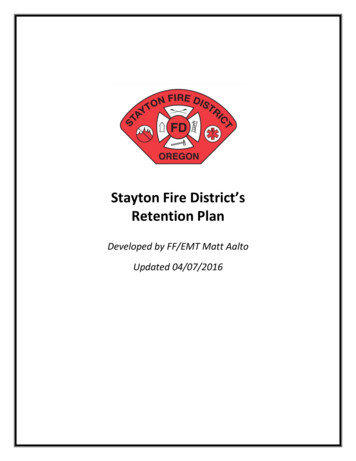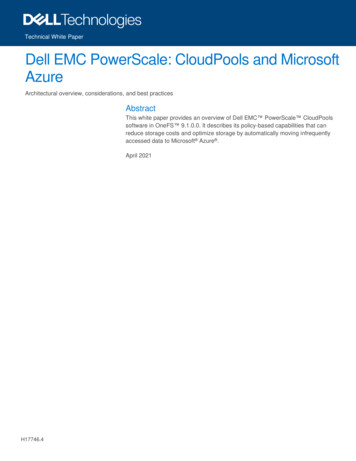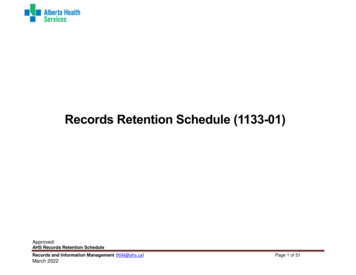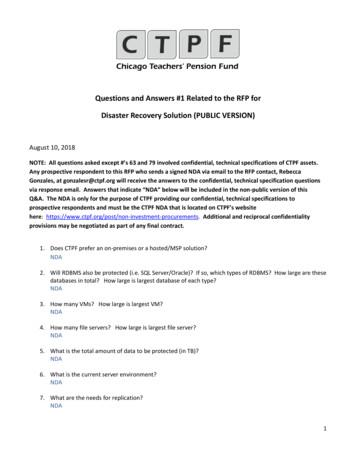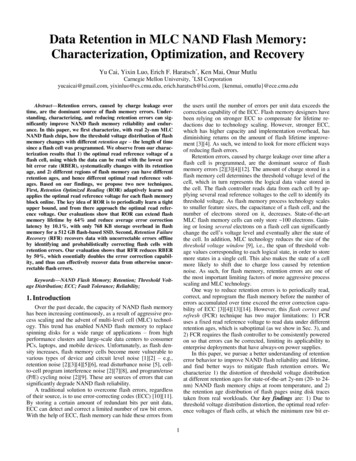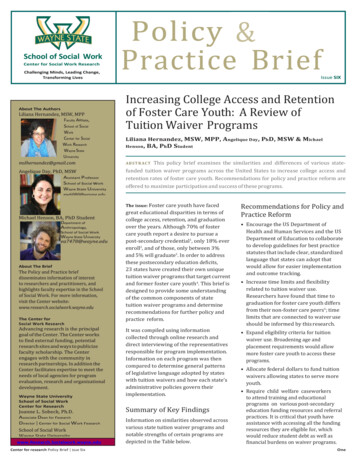
Transcription
&Increasing College Access and Retentionof Foster Care Youth: A Review ofTuition Waiver ProgramsLiliana Hernandez, MSW, MPP, Angelique Day, PhD, MSW & MichaelHenson,BA, PhD StudentThis policy brief examines the similarities and differences of various statefunded tuition waiver programs across the United States to increase college access andretention rates of foster care youth. Recommendations for policy and practice reform areoffered to maximize participation and success of these programs.ABSTRACTThe issue: Foster care youth have facedgreat educational disparities in terms ofcollege access, retention, and graduationover the years. Although 70% of fostercare youth report a desire to pursue apost-secondary credential1, only 18% everenroll2, and of those, only between 3%and 5% will graduate3. In order to addressthese postsecondary education deficits,23 states have created their own uniquetuition waiver programs that target currentand former foster care youth4. This brief isdesigned to provide some understandingof the common components of statetuition waiver programs and determinerecommendations for further policy andpractice reform.It was compiled using informationcollected through online research anddirect interviewing of the representativesresponsible for program implementation.Information on each program was thencompared to determine general patternsof legislative language adopted by stateswith tuition waivers and how each state’sadministrative policies govern theirimplementation.Summary of Key FindingsInformation on similarities observed acrossvarious state tuition waiver programs andnotable strengths of certain programs aredepicted in the Table below.Center for research Policy Brief issue SixRecommendations for Policy andPractice Reform Encourage the US Department ofHealth and Human Services and the USDepartment of Education to collaborateto develop guidelines for best practicestatutes that include clear, standardizedlanguage that states can adopt thatwould allow for easier implementationand outcome tracking. Increase time limits and flexibilityrelated to tuition waiver use.Researchers have found that time tograduation for foster care youth differsfrom their non-foster care peers5; timelimits that are connected to waiver useshould be informed by this research. Expand eligibility criteria for tuitionwaiver use. Broadening age andplacement requirements would allowmore foster care youth to access theseprograms. Allocate federal dollars to fund tuitionwaivers allowing states to serve moreyouth. Require child welfare caseworkersto attend training and educationalprograms on various post-secondaryeducation funding resources and referralpractices. It is critical that youth haveassistance with accessing all the fundingresources they are eligible for, whichwould reduce student debt as well asfinancial burdens on waiver programs.One
StateAlaskaArizonaTuition Waiver NameUniversity of AlaskaPresidential Foster YouthTuition WaiverTuition waiver for personsformerly in foster care;pilot program; report;definitionConnecticutPost-Secondary EducationProgramFloridaTuition and Fee ExemptionPolicy & ndentliving/etv.aspxHB /HB0300Z.pdfhttp://www.fc2sprograms.org/arizona/SB 1208http://www.azleg.gov/FormatDocument.asp?inDoc /legtext/51leg/1r/bills/sb1208h.htm&Session ID 110DCF: 48-20-2http://www.ct.gov/dcf/cwp/view.asp?a 2639&Q 379242DCF 2097- Application for Financial Assistance for Post ions240.235(5)KansasKansas Tuition WaiverProgram or Foster ChildEducation es/index.cfm?App Mode Display Statute&URL Ch0240/Sec235.htm&StatuteYear .pdfK.S.A. 75-53,112,K.S.A. /ch75/075 053 0112.htmlKentuckyMaineWaiver of tuition andmandatory student fees forKentucky foster or adoptedchildrenTuition Waiver Program(Foster /statutes/statute.aspx?id 42283http://www.famemaine.com/maine grants hhs/ocfs/cw/post.htmTitle 20: Part 5: Chapter s/financialAid/ProgramDescriptions/prog fostercare.aspSection 15-106.1 of the Education Article of the Maryland 2005/ged/15-106.1.htmlMarylandTuition Waiver for FosterCareRecipientsMassachusettsFoster Child Tuition Waiverand Fee Assistance Program t I Administration of the Government, Title II Executive andadministrative officers of the commonwealth, Chapter 15 A Section 19Public Education Title TitleII/Chapter15A/Section19Tuition Waiver for Persons http://www.hr.mnscu.edu/tuitionwaiver websys.htmlUnder GuardianshipMinnesota State Colleges and Universities System Procedures, Chapter5, Administration Procedures associated with board policy lMinnesotaCenter for research Policy Brief issue SixTwo
MissouriFoster care or residentialcare students, Waiver oftuition and Section l/17300002701.html?&me 173.270NewHampshireTuition Waiver for foster-childrenNew JerseyState Tuition WaiverNew MexicoFoster Care System TuitionWaiverNorthCarolinaTuition and Fee sUtahTuition WaiversWaive Tuition and Fees forcurrent or former fosterchild under 25 years of age.Department of Children,Youth and Families’ HigherEducation OpportunityIncentive GrantNeed-Based Grants forFoster YouthSec. 54.366. Tuition andFees Exemptions forStudents underConservatorship ofDepartment of Family andProtective ServicesTuition Waivers forchildren in long-term fostercare*State has no record of awaiver ever being usedCenter for research Policy Brief issue SixTitle XV, Section /njfc-scholars-program/Title 30. Chapter 4C. Article VIII. (New) Statewide Tuition WaiverProgram. §§1-5 s/AL03/132 /Tuition%20Waiver%20Brochure.pdfCS/SB actedLegislation/Statutes/PDF/ByChapter/Chapter l Aid Planning/Scholarships/Miscellaneous Scholarships/Independent Living Act.aspx10A Oklahoma Children and Juvenile Code, Section 1-9-107 & ocument.asp?CiteID 71TITLE 42 State Affairs and GovernmentCHAPTER 42-72.8 Department of Children, Youth, and Families'Higher Education Opportunity Incentive GrantSECTION esidents/SCNeed-basedGrantProgram.aspxPart 1B section 11.9 H03-COMMISSION ON HIGHER rch DOC&searchtext Federalist%20papers&category BUDGET&year 2015&version id 2&return page &version title As%20passed%20by%20the%20House&conid 7879701&result pos 0&keyval 30683&numrows 50http://www.dfps.state.tx.us/Child Protection/Youth and Young Adults/Post Secondary Education/college tuition waiver.aspTexas Education Code /Docs/ED/htm/ED.54.htm53B-8d-101.Establishes procedures for Utah system of higher ed institutions toadminister tuition waivershttp://le.utah.gov/ 2000/bills/hbillamd/HB0193.pdfTwo
VirginiaWestVirginiaGrant for tuition and fees3-7.4:5. Grant for tuition and fees for certain nal-institutions/23-7.4:5.htmlTuition waivers for highschool graduates in wv.us/WVCODE/ChapterEntire.cfm?chap 18b&art 10Summary of FindingsAreas of Comparison Similarities Observed19 states have specific ages for when youthRequirements formust have been in careafoster care9 states require youth to have spent a certaininvolvementamount of time in carebEligibility foradopted youth andyouth inguardianshipEducationalexpenses coveredRequirements forinitial waiverapplicationRequirements forwhen waiver can otable State ProgramsWV: Youth must be in foster care one yearprior to application18 states allow adopted youth to be eligiblefor waiversc14 states allow for youth in guardianships tobe eligible. Eligibility requirements vary bystatedCT: Youth not eligible if guardianship istransferred under a subsidized guardianship19 states specify only tuition and fees arecoveredeNC- covers living expenses includingtransportation and child care in addition totuition and feesCT- Can cover room and board, off campushousing, and books.RI- Covers “cost of attendance”, which can includeroom and boardSC- Can cover room and boardFL- Youth becomes ineligible at age 28KY- Youth must apply within four years ofobtaining high school diploma or completingGED11 states require youth to use waivers before a TX- Once youth has enrolled in the program,specific agegthere are no time limits on when tuition waiverscan be used8 states have a set number of years a youthcan use waiverh19 states have age limits when youth canapply for a waiverf5 states require student to be enrolled fulltimei15 states require students to maintain aminimum GPA, good academic standing,and/or satisfactory progressj6 states require students to meetnonacademic requirements, such ascommunity servicekMO- Priority is given to youth with 60 credithours or more and have 2.5 GPA or higherCT- Adopted youth must contribute 500 toeducation costs per yearAZ, MO, OR- Youth must complete a number ofcommunity service hoursAK, AZ, CT, FL, KS, KY, MA, MN, MO, NH, NJ, NM, NC, OK, OR, RI, SC, TX, VA;FL, MA, NH, NJ, OK, OR, UT, WV;c. AK, AZ, CT, FL, KS, KY, ME, MD, MA, MO, NH, NJ, NM, NC, OR, RI, TX, VA;d. AK, FL, KS, ME, MD, MA, MN, MO, NH, NM, OR, TX, VA, WV;e. AK, AZ, FL, KS, KY, ME, MD, MA, MN, MO, NH, NJ, NM, OK, OR, TX, UT VA, WV;a.b.Center for research Policy Brief issue SixTwo
AK, AZ, CT, FL, MD, MA, MN, MO, NH, NJ, NM, NC, OK, OR, RI, SC, TX, UT, WV;AZ, CT, FL, KS, MA, MN, NH, NM, OK, RI, UT;h. AK, KY, ME, MD, MO, NJ, NC, OR;i. AK, CT, NH, NJ,RI;j. AK, AZ, CT, KY, ME, MD, MA, MN, MO, NJ, NC, OK, RI, UT, WV;k. AZ, CT, MN, MO, NC, ORf.g.References1. Tzawa-Hayden, A. (2004). Take me higher: Helpingfoster youth pursue higher education, Child Law Practice23 (10). 163–166.2. Courtney, M.E. (2009). The difficult transition toadulthood for foster youth in the U.S.: Implications forState as a corporate parent. Social Policy Report, 23 (1). 319.3. Davis, R.J. (2006). College access, financial aid andcollege success for undergraduates from foster care.Washington, DC: National Association of Student FinancialAid Administrators. FosterCare%20Report.PdfCenter for research Policy Brief issue Six4. Hernandez, L., Day, A., & Crosby, S. (2015). State TuitionWaiver Programs and Education training Vouchers forYouth in Foster Care. Retrieved 3898085/state tuitionwaivers and etv-revised 2.27.15.pdf5. Day, A., Dworsky, A., & Feng, W. (2013). A Discrete TimeSurvival Analysis of theRelationship Between Foster Care Placement and the Rateof Graduation from a Four-Year University. Journal ofResearch in Higher Education, 19. Retrieved fromhttp://www.aabri. com/rhej.htmlTwo
Liliana Hernandez, MSW, MPP, A ngelique Day, P h D, MSW & M ichael Henson, BA, P h D S tudent ABSTRACT This policy brief examines the similarities and differences of various state-funded tuition waiver programs across the United States to increase college access and retention rates of foster care youth.


